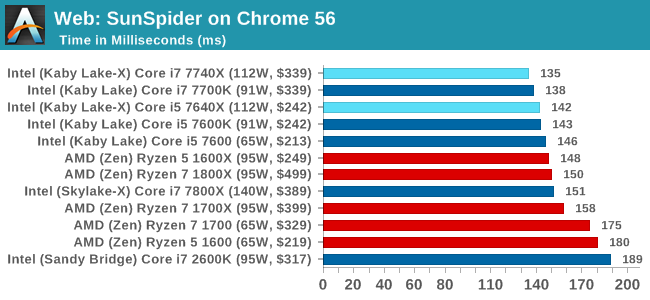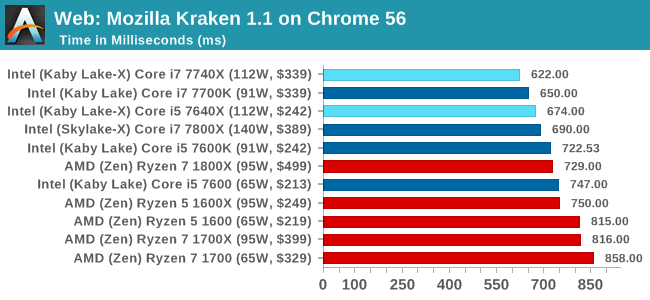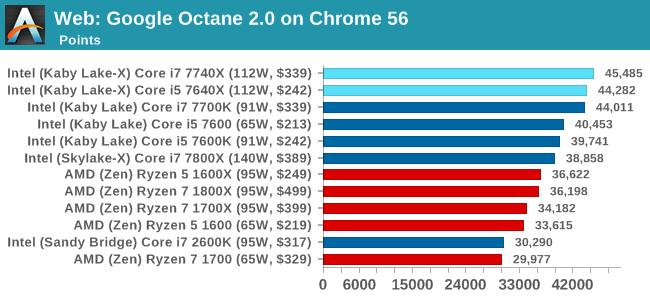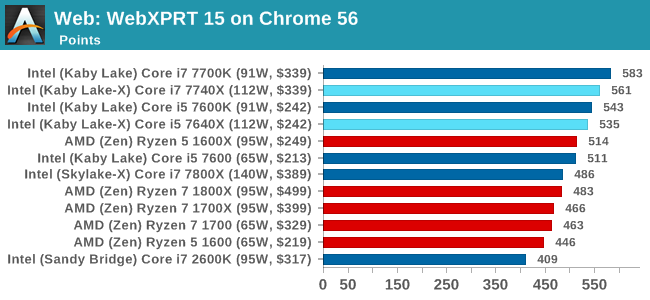The Intel Kaby Lake-X i7 7740X and i5 7640X Review: The New Single-Threaded Champion, OC to 5GHz
by Ian Cutress on July 24, 2017 8:30 AM EST- Posted in
- CPUs
- Intel
- Kaby Lake
- X299
- Basin Falls
- Kaby Lake-X
- i7-7740X
- i5-7640X
Benchmarking Performance: CPU Web Tests
One of the issues when running web-based tests is the nature of modern browsers to automatically install updates. This means any sustained period of benchmarking will invariably fall foul of the 'it's updated beyond the state of comparison' rule, especially when browsers will update if you give them half a second to think about it. Despite this, we were able to find a series of commands to create an un-updatable version of Chrome 56 for our 2017 test suite. While this means we might not be on the bleeding edge of the latest browser, it makes the scores between CPUs comparable.
All of our benchmark results can also be found in our benchmark engine, Bench.
SunSpider 1.0.2: link
The oldest web-based benchmark in this portion of our test is SunSpider. This is a very basic javascript algorithm tool, and ends up being more a measure of IPC and latency than anything else, with most high-performance CPUs scoring around about the same. The basic test is looped 10 times and the average taken. We run the basic test 4 times.

SunSpider has a single threaded focus, and we see the Kaby Lake-X processors take their spots at the top of the graph.
Mozilla Kraken 1.1: link
Kraken is another Javascript based benchmark, using the same test harness as SunSpider, but focusing on more stringent real-world use cases and libraries, such as audio processing and image filters. Again, the basic test is looped ten times, and we run the basic test four times.

Mozilla too relies on single threaded IPC and frequency.
Google Octane 2.0: link
Along with Mozilla, as Google is a major browser developer, having peak JS performance is typically a critical asset when comparing against the other OS developers. In the same way that SunSpider is a very early JS benchmark, and Kraken is a bit newer, Octane aims to be more relevant to real workloads, especially in power constrained devices such as smartphones and tablets.

Octane is an interesting benchmark, requiring cores and ST performance, but mostly the latter. It also seems that either Intel's design is optimized for the benchmark or vice versa, given the substantial difference in performance. There's no way for the benchmark to use all of the threads from AMD, nor the 12 threads in the Core i7-7800X which has a lower single thread performance.
WebXPRT 2015: link
While the previous three benchmarks do calculations in the background and represent a score, WebXPRT is designed to be a better interpretation of visual workloads that a professional user might have, such as browser based applications, graphing, image editing, sort/analysis, scientific analysis and financial tools.

WebXPRT is a mix of ST and MT, but still based in the web and relies on ST performance a lot. Given the variable loading on the benchmark, Intel's newest features such as Speed Shift help keep it at the top.










176 Comments
View All Comments
djayjp - Monday, July 24, 2017 - link
Ian, why didn't you check if the OC was being thermally throttled? Easy enough to check this. And easy enough to see if it's the temperature of the cores or not. Surprising you wouldn't include temperature or power consumption data with the OC (though I understand this hasn't typically been a focus of AT). Another site demonstrated throttling at ~95+ C.mapesdhs - Monday, July 24, 2017 - link
Is that the same site which showed that the TIM Intel is using is just not allowing the heat to get from the die to the cap? Die temp shoots up, cap temp doesn't, even with a chiller cooler.melgross - Monday, July 24, 2017 - link
This article gives a good reason why huge numbers of core are a waste of money for most users.http://www.computerworld.com/article/3209724/compu...
Old_Fogie_Late_Bloomer - Monday, July 24, 2017 - link
Yeah, don't bother starting the article unless you're willing to create yet another useless online identity. Shame, since it seemed moderately interesting, but...alpha754293 - Monday, July 24, 2017 - link
re: overclockingThat works well for the occasional heavy workload, but if you are going to be constantly running at peak load (like I did for engineering analysis), overclocking of any kind, from my experience, isn't worth the dead core or entire CPU.
I've already fried a core on the 3930K once before taking it up from 3.2 GHz stock, 3.5 GHz max TurboBoost to 4.5 GHz.
mapesdhs - Monday, July 24, 2017 - link
Alas this stuff does vary according to the invidual CPU, mbd, RAM, etc. What cooling did you use? Could also be the vcore was too high - a lot of SB-E users employed a high vcore, not realising that using a lower PLL would often make such a high vcore unnecessary. It's even more complicated if one fills all 8 RAM slots on a typical X79 mbd.alpha754293 - Tuesday, July 25, 2017 - link
The cooling that I was using was Corsair H80i v2.The temps were fine and were consistently fine.
RAM was 8x 8 GB Cruical Ballistix Sport I think DDR3-1600? Something like that. Nothing special, but nothing super crappy either. I actually had the entire set of RAM (all eight DIMMs RMA'd once) so I know that I got a whole new set back when that happened about oh...maybe a-year-and-a-half ago now? Something like that.
Motherboard was Asus X79 Sabertooth.
Yeah, I had all 8 DIMM slots populated because it was a cheaper option compared to 4x 16 GB. Besides, using all 8 DIMMs also was able to make use of the quad-channel memory whereas going with 4x 16 GB - you can't/won't (since the memory needed to be installed in paired DIMM slots).
That CPU is now "castrated" down to 4 cores (out of 6) because 1 of the cores died (e.g. will consistently throw BSODs, but if I disable it, no problems). Makes for a decent job scheduler (or at least that's the proposed task/life for it).
Dr. Swag - Monday, July 24, 2017 - link
Hey Ian, on the first page you listed the turbo of the 7700k as 4.4, whereas it's actually 4.5Yuriman - Monday, July 24, 2017 - link
Shouldn't the 7700K read "4.2-4.5ghz" rather than 4.2-4.4?Dug - Monday, July 24, 2017 - link
On RoTR-1-Valley 1080p it shows i5 7600k at 141fps and the i7 7700k at 103fps. Have a feeling these might be transposed.